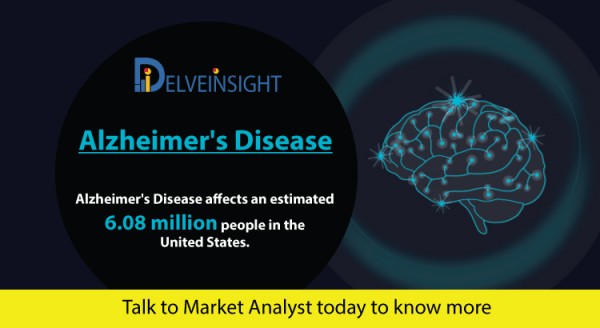Alzheimer’s Disease is an irreversible and progressive brain disorder, which destroys memory, thinking skills, and the capability to carry out the most manageable tasks. The Disease is the most common cause of dementia (a continuous decline in thinking, behavioural and social skills that disrupts a person’s ability to function independently) accounting for around 60–80% of cases.
The sixth-leading cause of death in the United States is Alzheimer’s Disease. On average, a person with Alzheimer’s lives 4–8 years after diagnosis but can live as long as 20 years, depending on other factors.
How Alzheimer’s Disease has impacted people’s lives?

An estimated of 6.08 million people in the US is affected by Alzheimer’s Disease, and around 200,000 people younger than 65 years. Among the Alzheimer’s Disease patients, females show a higher proportion of Alzheimer’s Disease prevalence as compared to males.
As per the National Center for Chronic Disease Prevention and Health Promotion, an estimated 5 million Americans, who are aged 65 years or older, had Alzheimer’s Disease in 2014. This is projected to nearly triple to 14 million people by 2060.
How will Disease transform Alzheimer’s Disease Market?
There is no known cure for Disease, and present approaches focus on benefiting people to maintain mental function, manage behavioural symptoms, and decrease specific problems, like memory loss.
Though two categories of drugs are approved for Alzheimer’s Disease treatment are cholinesterase inhibitors and partial N-methyl D-aspartate (NMDA) antagonists.
The mechanism of Cholinesterase inhibitors is by raising the level of acetylcholine; a chemical is taken up by nerve cells to communicate with each other and is vital for learning, memory, and cognitive functions.
The three drugs: Donepezil (Aricept), Rivastigmine (Exelon), and Galantamine (Razadyne) are FDA-approved for Alzheimer’s Disease treatment and are used to treat mild-to-moderate Alzheimer’s Disease.
Donepezil can be used in all stages of Alzheimer disease. Galantamine and rivastigmine are approved for treatment in mild-to-moderate Alzheimer disease only. Donepezil and galantamine are rapid, reversible inhibitors of acetylcholinesterase. Rivastigmine is a slow, reversible inhibitor of acetylcholinesterase and butyrylcholinesterase.
Partial N-Methyl D-aspartate (NMDA) antagonist includes memantine. Memantine (Namenda) is used to treat moderate-to-severe Alzheimer’s Disease. They may benefit by reducing symptoms and help with some behavioural issues. However, these drugs do not change the underlying disease process. They are useful for some but not all people and may help only for a limited time.
The FDA has also approved Aricept and Namzaric, a combination of Namenda and Aricept, for the treatment of moderate-to-severe Alzheimer’s Disease.
Which biotechnical companies are developing Alzheimer’s Disease drugs?
Some of the key players in Alzheimer’s Disease market at a global level are as follows:-
- Neurotrope bioscience
- Amarantus Bioscience Holdings
- AgeneBio
- Novartis
- Cortexyme
- TauRx Therapeutics
- Otsuka Pharmaceutical
- AC Immune
- Genentech
- Alkahest
- AZ Therapies
- Cerecin
- vTv Therapeutics and many others.
The launch of potential emerging therapies in Alzheimer’s Disease market like Bryostatin-1 (Neurotrope Bioscience), Eltoprazine (Amarantus Bioscience Holdings), AGB101 (AgeneBio), CAD106 and CNP520 (Novartis), COR388 HCL (Cortexyme), TRx0237 (TauRx Therapeutics), brexpiprazole (Otsuka Pharmaceutical), RO7105705 (Genentech/AC Immune), AKST/GRF6019 (Alkahest), ALZT-OP1 (AZ Therapies), Tricaprilin (Cerecin), Azeliragon (vTv Therapeutics), and others are anticipated to change the Alzheimer’s Disease treatment landscape in the upcoming years.
Media Contact
Company Name: DelveInsight
Contact Person: DelveInsight
Email: Send Email
Phone: +919650213330
City: Albany
State: New York
Country: United States
Website: https://www.delveinsight.com/

